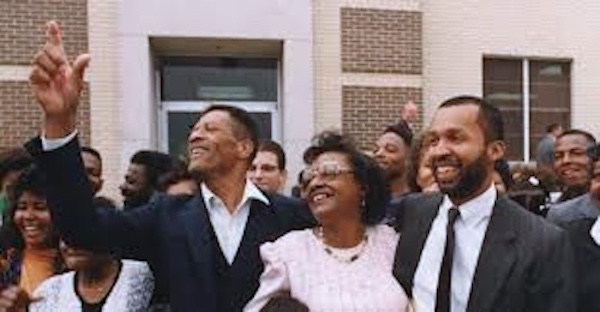Jim Beam column:Movie highlights injustice
Published 6:48 am Saturday, February 15, 2025

- Walter McMillen, left, his wife and Bryan Stevenson, McMillen's Harvard-educated attorney, celebrate McMillen's long sought freedom.(Photo courtesy of Equal Justice Initiative).
The morning after watching a movie about a wrongly convicted Alabama Black man on death row, I was surprised to see a story about Louisiana resuming executions after nearly 15 years without them.
Wrongful convictions are one of the main reasons why many people oppose the death penalty. “Just Mercy” was the title of the 2019 movie that was based on the true story of the late Walter McMillian of Monroeville, Alabama.
McMillian was arrested in 1987 for the November 1986 murder of an 18-year-old clerk at a cleaner’s business where she worked. The Equal Justice Initiative (EJI) said McMillian was held on death row even before he was convicted and sentenced to death.
Three witnesses testified against him, the main witness a White man accused of crimes in another county. He was pressured by law enforcement to accuse McMillian of the murder.
The jury ignored multiple alibi witnesses who were Black and who testified McMillian was at a church fish fry 11 miles away at the time of the crime.
EJI said what seemed to focus attention on McMillian was the fact he had an affair with a married White woman and there was a very public divorce between the woman and her husband.
The jury with only one Black member convicted McMillian of capital murder and sentenced him to life imprisonment without parole. However, Alabama judges were authorized to override a jury’s verdict and the judge imposed the death penalty and death by electrocution.
McMillian was fortunate to have Harvard-educated attorney Bryan Stevenson as his lawyer. Stevenson wrote what has been described as a thought-provoking memoir, “Just Mercy,” according to a report by ICON Magazine at icon.ink.
The magazine said, “Clear-sighted and compassionate, Stevenson has battled against the echoes of the Jim Crow segregation era and its effects on the American criminal justice system his entire career as a defendant to the wrongfully condemned.”
EJI said its staff and Stevenson found evidence that the state’s major witness against McMillian had been coerced, including tape recordings proving he had been pressured to falsely testify. The chief witness later retracted his false testimony in court.
Despite that new evidence, it took six years of hearings and appeals before the Alabama Court of Criminal Appeals finally ruled that McMillian’s conviction was unconstitutional. McMillian was released from death row as a free man in March of 1993.
A “60 Minutes” segment and other national press coverage about the case led to other exonerations. McMillian also testified before the U.S. Senate Judiciary Committee, saying he was troubled by the way he was treated by the criminal justice system and the difficulty he had in proving his innocence.
The Montgomery Advertiser in a Dec. 14, 1997, story said eight men were executed in Alabama’s electric chair while McMillian was in prison on death row for six years.
McMillian told the newspaper, “It’s been pretty rough, but then again it’s been good, too. It’s hard to get it back together. I’ve had to learn how to live all over again.”
EJI said the trauma McMillian experienced led to early-onset dementia. He lost his logging business and sold car parts until he became too ill to work. In the last two years of his life, he couldn’t enjoy the outdoors or get around much without help. He died on Sept. 11, 2013.
The Death Penalty Information Center said there have been 1,610 executions in this country since 1976. The race of defendants executed was White, 896; Black, 549; Latino/a, 134; and others, 31.
The center said an average of 4 wrongly convicted death-row prisoners have been exonerated each year since 1973. Florida led with 30 exonerations, followed by Illinois, 22; Texas, 18; Pennsylvania, 13; and Louisiana and North Carolina, 12 each.
As of Oct. 1, 2024, the center said California led with 613 death row prisoners, followed by Florida, 289; and Texas, Alabama, North Carolina, Arizona, Ohio, and Pennsylvania, all over 100, and Louisiana with 63.
The U.S. Supreme Court on June 29, 1972, found the death penalty unconstitutional, but allowed executions to resume under revised laws four years later.
There are currently 23 non-death penalty states and the District of Columbia. Some Louisiana legislators have made efforts to end the death penalty, but none have come close.
Jim Beam, the retired editor of the American Press, has covered people and politics for more than six decades. Contact him at 337-515-8871 or jim.beam.press@gmail.com.
| ReplyForward
Add reaction |





